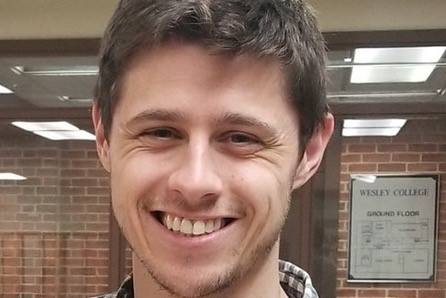Matthew Costello always intended to pursue a career that could positively affect the world and make a difference in the lives of those around him. He chose to research infectious diseases and prepare for possible outbreaks, and now, three years into his graduate work, he finds himself in the middle of a pandemic. He says he appreciates the opportunity to be involved in the effort to contribute any knowledge that will move forward the development of a COVID-19 vaccine. Here’s what he had to say about his experiences at UConn.
Where did you study as an undergraduate? What was your major?
I completed my undergraduate education at the University of Connecticut. I graduated with a Bachelor of Science in biology.
Why did you decide to go to graduate school?
I decided to further my education two years after I graduated from UConn. During that time, I worked as an administrator for an international summer school program, served as an AmeriCorps member at a public health non-profit, worked at FedEx as a package handler, worked as an admissions counselor for a private university and landscaped. While I enjoyed and learned from each of these experiences, I found myself wanting to return to school to learn more about the field I received my undergraduate degree in, biology. Through my work experience, most notably during my time at AmeriCorps, I developed a strong interest in infectious disease control, public health and education. I re-enrolled at UConn in the Professional Science Master’s Program with the intent of developing stronger laboratory skills and gaining a better understanding of what career opportunities were available, specifically as they related to infectious disease and public health. After completing my masters, I elected to pursue a Ph.D. in pathobiology to further my understanding of infectious diseases.
Who is your advisor? What is your field of research?
My advisor is Dr. Paulo Verardi. In our lab, we conduct research on the development of vaccine candidates against emerging and reemerging arboviruses. In response to current events, we are in the process of adapting our vaccine platforms to produce vaccine candidates against SARS-CoV-2.
Name one aspect of your work that you like.
I genuinely enjoy the mental challenge science brings. I find great fulfillment in being given a question, an array of tools and resources, and an opportunity to apply them to determine an answer. Conducting research feels like trying to solve an incredibly complex puzzle. It may take weeks, months even, to determine how particular pieces fit, but there is an immense satisfaction that comes from finally seeing how they come together to make a larger picture. I particularly enjoy how the knowledge and skills I’m acquiring can be used to make things that have potential to help people.
In your opinion, what is your greatest accomplishment so far?
I would say my greatest accomplishment so far has simply been adjusting to life as a student again and learning how to be a research scientist. I did not intend to become involved in research while I was an undergraduate. When I entered graduate school, I had never conducted any sort of independent research and had never conducted experiments outside of lab courses. I felt out of place during my first classes of graduate school. I was a few years older than the majority of my peers and rusty on my knowledge and study skills. My first semester back in school, I remember it taking me over six hours to read and understand a research article assigned for class. Despite this, I was able to work my way from having almost no foundation in scientific research to developing enough knowledge and expertise to pursue a Ph.D. I’m still learning, but I am proud of the progress I have made to get where I am now.
When do you expect to get your degree? What then?
I am hoping to graduate from this program within the next three to four years. Once I am done, I would love to work for a local, state or federal public health department in infectious disease control and risk communication. As much as I enjoy conducting research, I hope to eventually work in a position where I can interact directly with communities to improve health outcomes.
Is there anything else you would like us to know about you?
If I didn’t end up back in graduate school, I’d probably have ended up working as a high school biology teacher who wrote books and landscaped over the summer. I’d also have worked with some friends to figure out how to open a brewery.



